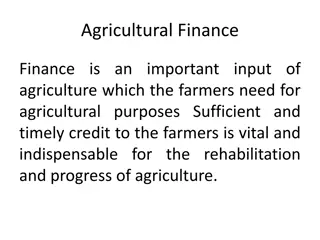Understanding NABARD: Role in Agricultural and Rural Development
National Bank for Agriculture and Rural Development (NABARD) is a key regulatory body in India's rural banking system, established by the government to provide and regulate credit in rural areas. NABARD plays a crucial role in promoting rural development by supporting industries like agriculture, cottage industries, and small-scale enterprises. Learn about its formation, functions, and impact on rural finance and development.
Download Presentation

Please find below an Image/Link to download the presentation.
The content on the website is provided AS IS for your information and personal use only. It may not be sold, licensed, or shared on other websites without obtaining consent from the author. Download presentation by click this link. If you encounter any issues during the download, it is possible that the publisher has removed the file from their server.
E N D
Presentation Transcript
What is NABARD? National Bank for Agriculture and Rural Development or NABARD is the main regulatory body in the country s rural banking system and is considered as the peak development finance institution which is established and owned by the government of India. This bank aims to provide and regulate credit to the rural areas, which will be a first step towards enhancing the rural development in the country. NABARD has been given many responsibilities related to the formulation of policies, planning, and operations in agriculture and financial development. NABARD carries these responsibilities efficiently and works towards promoting and developing man industries in the rural areas like the agriculture industry, cottage industries, other small scale industries, and rural crafts in an effort to create better infrastructure and better employment opportunities for the people living in these regions. The Government of India established this bank considering all the guidelines of the National Bank for Agriculture and Development Act of 1981. To put it in simple terms, you can say that the National Bank for Agriculture and Rural Development or NABARD is the main and specific bank of the country for agriculture and rural development.
Formation of NABARD NABARD's establishment took place on 12 July 1982 as a central regulating body for agriculture financing and rural section. The government of India established NABARD under the outlines of the National Bank for Agriculture and Rural Development Act 1981.
Functions of NABARD Now that we have seen what NABARD stands for and the roles that it has to perform, let us go through the functions performed by the bank. In an effort to keep up with its roles, the National Bank for Agriculture and Rural Development undergoes four central functions. These four central functions performed by the NABARD are credit functions, financial functions, supervisory functions, and development functions. To understand all these four functions performed by the NABARD, let s go through all of them one by one.
Functions of NABARD Credit functions As the main provider of credit facilities in rural areas, the National Bank for Agriculture and Rural Development or NABARD performs the credit functions. Under these functions, the bank provides, regulates, and monitors the credit flow in the rural parts of the nation.
Functions of NABARD Financial functions NABARD has many client banks and institutions that help and assist in the developmental activities in rural areas. By performing the financial functions, the National Bank for Agriculture and Rural Development or NABARD provides loans to these client banks and institutions like handicraft industries, food parks, processing units, artisans and many more.
Functions of NABARD Supervisory functions As already discussed above, NABARD is the apex institution that looks after agriculture and rural development. This is why the responsibility of monitoring and regulating all the development activities and projects fall on this institution. Given this role, the NABARD performs supervisory functions in which it has to keep a check on all the client banks, institutions, credits and non-credits societies that are a part of the developmental tasks taking place in the rural areas.
Functions of NABARD Development Functions As you must be pretty much aware by now that the primary role of the National Bank for Agriculture and Rural Development or NABARD is to focus on developing sustainable agriculture and promote rural development, the bank performs development functions in an effort to stay true to this role. Under developmental functions, the NABARD helps rural banks prepare action plans for the developmental activities. The National Bank for Agriculture or Rural Development or NABARD performs all the above roles and functions efficiently and has a great impact on the agricultural progress and rural development in the country.

















































